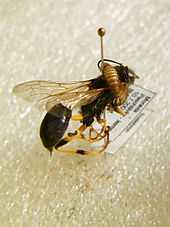Sceliphron
| Sceliphron | |
|---|---|
 | |
| Sceliphron spirifex in Tanzania | |
| Scientific classification | |
| Kingdom: | Animalia |
| Phylum: | Arthropoda |
| Class: | Insecta |
| Order: | Hymenoptera |
| Superfamily: | Apoidea |
| Family: | Sphecidae |
| Subfamily: | Sceliphrinae |
| Genus: | Sceliphron Klug 1801 |
| Diversity | |
|
About 30 species | |
Sceliphron is a genus of Hymenoptera of the Sphecidae family of wasps, commonly referred to as mud daubers. They are solitary and build nests made of mud. Nests are frequently constructed in shaded niches, often just inside of windows or vent openings, and it may take a female only a day to construct a cell requiring dozens of trips carrying mud. Females will add new cells one by one to the nest after each cell is provisioned. They provision these nests with spiders, such as crab spiders, orb-weaver spiders and jumping spiders in particular, as food for the developing larvae. Each mud cell contains one egg and is provided with several prey items. Females of some species lay a modest average of 15 eggs over their whole lifespan . Various parasites attack these nests, including several species of cuckoo wasps, primarily by sneaking into the nest while the resident mud dauber is out foraging.
As is the case with many insect genera, there are many tropical species. Some common temperate species include the black and yellow mud dauber (Sceliphron caementarium) and Sceliphron curvatum.
Like other solitary wasps, Sceliphron species are not aggressive and do not sting unless mishandled. They are sometimes regarded as beneficial due to their control of spider populations, though the spiders themselves may be beneficial in controlling pest insects. Species such as Sceliphron curvatum are invasive in some parts of Europe, where they have been observed to rapidly increase their range in recent years .
Sceliphron species
- Sceliphron abdominale Dalla Torre 1897
- Sceliphron argentifrons Cresson 1916
- Sceliphron asiaticum Linnaeus 1758 (Sphex); Neotropics
- Type locality In Indiis was interpreted as India; syn. S. figulum
- Sceliphron assimile Dahlbom 1843 (Pelopoeus); Texas, Mexico and Caribbean islands
- Sceliphron benignum Smith 1859
- Sceliphron bugabense Dalla Torre 1897
- Sceliphron caementarium Drury 1773 (Sphex) – Black and yellow mud dauber
- North America, established in Europe and Pacific islands by the 1970s
- Sceliphron caucasicum Dalla Torre 1897
- Sceliphron chilensis Spinola 1851
- Sceliphron coromandelicum Lepeletier 1845
- Sceliphron curvatum Smith 1870; Asia, Europe since 1970s
- Sceliphron cyclocephalum Dalla Torre 1897
- Sceliphron deforme Smith 1856; Asia, reported from Europe in 2004
- Sceliphron destillatorium Illiger 1807; southern Palaearctic
- Sceliphron fistularium Dahlbom 1843; Neotropics
- Sceliphron formosum Smith 1856; Australia
- Sceliphron imflexum Sickmann 1894
- Sceliphron intermedium Dalla Torre 1897
- Sceliphron jamaicense Fabricius 1775; Mexico, Caribbean islands
- Sceliphron javanum Lepeletier 1845
- Sceliphron laetum Smith 1856; Australia
- Sceliphron madraspatanum Fabricius 1781; Mediterranean
- Sceliphron nalandicum Strand 1915
- Sceliphron quartinae Gribodo 1884
- Sceliphron rufiventre Dalla Torre 1897
- Sceliphron soror Dalla Torre 1897
- Sceliphron spirifex Linnaeus 1758 (Sphex); Africa, southern Europe
- Sceliphron (madraspatanum) tubifex Latreille 1809; Mediterranean
See also
References
- Observations on the biology of Sceliphron spirifex (Linnaeus, 1758) in Romagna, Pezzi G.
- Ćetković, Aleksandar; Ivica Radović, Ljiljana Ðorović (2004). "Further evidence of the Asian mud-daubing wasps in Europe (Hymenoptera: Sphecidae)". Entomological Science 7 (3): 225–229. doi:10.1111/j.1479-8298.2004.00067.x.
Gallery
-

Sceliphron caementarium of North America
-

Sceliphron caementarium'
-

Sceliphron caementarium
-

Sceliphron spirifex L. of Africa and Europe
-

Sceliphron destillatorius
-

Sceliphron nest
-

Sceliphron destillatorium
External links
| Wikimedia Commons has media related to Sceliphron. |
| Wikisource has the text of a 1905 New International Encyclopedia article about Sceliphron. |
- Short discussion on genus Sceliphron.
- Discussion on an Australian species, Sceliphron formosum
- Discussion on an American species, Sceliphron caementarium
- Online guide to eastern North American Sphecidae Documents how to differentiate Sceliphron caementarium from other Sphecids
